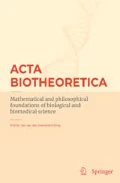Summary
The word “Umwelt” is not translated as yet and can perhaps not be translated. In its orginal and well known sense, inaugurated byUexküll, it means of the relations of an organism to its surroundings only those going over the receptive (sense-) organs and the effective organs (muscles, glands), while vegetative relations to the medium,e.g. respiration are excluded. The “Umwelt”-conception of ecology has always been a wider one, but by feeling only, without definition. H.Weber has tried to develop a “general biological Umwelt-conception”, including a 11 relations. In spite of this claim he states, the “Umwelt” of a species be only those external conditions which are indispensable for its life. Here is demonstrated that this conception is quite insufficient, especially because it does not contain so fundamentally important relations as the enemies of an organism and the reactions of the organism upon its surroundings (e.g. formation of limestone, humification of soil, turning of lakes into land by vegetation). Furthermore, that conception of “Umwelt” does not contain external conditions determinating the phenotype but not indispensable for the life of the species. A “general biological conception of Umwelt”, asWeber claims to have created, is impossible; the conception is divided in steps corresponding to its application in different branches of science. In physiologye.g. only the direct relations of an organism come in question, in epidemiology the vital relations only. The ecological conception is the most comprehensive (the real “general” one), containing all those parts of the surroundings to which an organism has direct or definite indirect relations, and is the complex of them.
Résumé
Le mot „Umwelt” n'est pas traduit et ne peut pas être traduit peut-être. Dans son sens original et bien connu, créé parUexküll, il comprend des relations d'un organisme à ses environs celles seulement, qui passent par les organes recepteurs (organes de sens) et les organes effectuants (muscles, glandes), pendant que les relations végétatives au médium, p.e. respiration ne sont pas comprises. L'écologie toujours a fait usuage du mot „Umwelt” dans un autre sens, mais intuitivement, sans définition. H.Weber a essayé de développer une conception „Umwelt”, dont il prétend la signification dans toute la biologie et qui comprenne toutes les relations. Malgré cette prétention,Weber comprend dans sa définition de la „Umwelt” d'une espèce ces relations seulement, qui sont indispensables pour leur vie. Ici est démontré que cette conception est tout à fait insuffisante, surtout pare qu'elle ne comprend pas des relations d'une importance si fondamentale comme l'ennemi d'un être vivant et les réactions de l'être vivant qui transforment ses environs (p.e. formation de pierre à chaux, humification du sol, transformation en terre d'un lac par la végétation). Y manquent aussi des conditions extérieures, déterminantes le phénotype, mais qui ne sont indispensables pour la vie de l'espèce. Une signification générale du mot Umwelt pour toute la biologie est impossible, la conception est divisée en échelons qui correspondent à l'application dans des branches différentes de la science. En physiologie p.e. il ne s'agit que des relations directes, en épidémiologie des relations d'importance vitale seulement. La signification écologique est la plus ample (la vraiment „générale”), comprenant toutes ces parties du milieu, auxquelles un organisme a des relations directes ou indirectes, dont la „Umwelt” est le complexe.
Similar content being viewed by others
Literatur
Burkamp, W. (1929). Die Struktur der Ganzheiten. - Berlin.
Elton, C. (1933)- The ecology of animals. - London, 97 p.
Escherich, K. (1935). Biologisches Gleichgewicht. Rektoratsrede. - München, A. Langen & G. Müller, 22 p.
Friederichs, K. (1927). Grundsätzliches über die Lebenseinheiten höherer Ordnung und den ökologischen Einheitsfaktor. - Naturwissenschaften XV, p. 153–157, 182–186.
— (1930). Die Grundfragen und Gesetzmässigkeiteri der land- und forstwissen-schaftlichen Zoologie, insbesondere der Entomologie. I. Ökologischer Teil. - Berlin, P. Parey, xii + 419 p.
— (1934). Vom Wesen der Ökologie. - Sudhoff s Arch. Gesch. Med. XXVII, p. 277–285
— (1937). Ökologie als Wissenschaft von der Natur oder biologische Raum-forschung. (Bios VII) - Leipzig, J. A. Barth, viii + 108 p.
— (1942). Leben als hochdimensionale Ordnung und das Leib-Seele-Verhältnis. - Acta biotheor. VI, p. 1–36.
Petersen, H. (1937). Die Eigenwelt des Menschen. (Bios VIII) - Leipzig, J. A. Barth, vi + 28 p.
Schwerdtfeger, F. (1941). Über die Ursachen des Massenwechsels der Insekten. - Z. angew. Ent. XXVIII, p. 254–304.
Seifert, A. (1942). Im Zeitalter des Lebendigen. Natur, Heimat, Technik. - Planegg vor München.
Thienemann, A. (1918). Lebensgemeinschaft und Lebensraum. - Naturwiss. Wschr., N.F., XVII, p. 280–282, 297–303.
Uexküll, J. von (1921). Umwelt und Innenwelt der Tiere. 2. Aufl. - Berlin, J. Springer, vi + 224 p.
Weber, H. (1939). Zur Fassung und Gliederung eines allgemeinen biologischen Umweltbegriffes. - Naturwissenschaften XXVII, p. 633–644.
— (1939). Der Umweltbegriff der Biologie und seine Anwendung. - Biologe VIII, p. 245–261.
— (1941). Zum gegenwärtigen Stand der allgemeinen Ökologie. - Naturwissenschaften XXIX, p. 756–763.
— (1942). Der gegenwärtige Stand der ökologischen Forschung, an Beispielen aus der Ökologie der Tiere aufgezeigt. - Forsch. Fortschr. dtsch. Wiss. XVIII, p. 125–129.
Woltereck, R. (1932,). Grundzüge einer allgemeinen Biologie. Die Organismen als Gefüge, Getriebe, als Normen und als erlebende Subjekte. - Stuttgart, F. Enke, xvi + 629 p.
— (1942). Philosophie der lebendigen Wirklichkeit. II. Ontologie des Lebendigen. - Stuttgart, F. Enke, xvi + 484 p.
Author information
Authors and Affiliations
Rights and permissions
About this article
Cite this article
Friederichs, K. Über den Begriff „Umwelt” in der Biologie. Acta Biotheor 7, 147–162 (1943). https://doi.org/10.1007/BF01578160
Received:
Issue Date:
DOI: https://doi.org/10.1007/BF01578160



